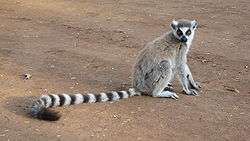Definify.com
Webster 1913 Edition
Lemur
Le′mur
(lē′mŭr)
, Noun.
[L., a ghost, specter. So called on account of its habit of going abroad by night.]
(Zool.)
One of a family (
Lemuridæ
) of nocturnal mammals allied to the monkeys, but of small size, and having a sharp and foxlike muzzle, and large eyes. They feed upon birds, insects, and fruit, and are mostly natives of Madagascar and the neighboring islands, one genus (Galago
) occurring in Africa. The slow lemur or kukang
of the East Indies is Nycticebus tardigradus
. See Galago
, Indris
, and Colugo
. Webster 1828 Edition
Lemur
LE'MUR
,Noun.
Definition 2026
Lemur
Lemur
Translingual

Ring-tailed lemur (Lemur catta)
Proper noun
Lemur m
- A taxonomic genus within the family Lemuridae – the ring-tailed lemur.
Hyponyms
- (genus): Lemur catta - the only species
References
- ↑ A. R. Dunkel; J. S. Zijlstra; C. P. Groves (2011/2012), “Giant Rabbits, Marmosets, and British Comedies: Etymology of Lemur Names, Part 1”, in Lemur News, volume 16, retrieved 11 April 2013, pages 64–70.
lemur
lemur
English

Ring-tailed lemur (Lemur catta)
Noun
lemur (plural lemurs)
- (colloquial) Any strepsirrhine primate of the infraorder Lemuriformes, superfamily Lemuroidea, native only to Madagascar and some surrounding islands.
- The genus Lemur, represented by the ring-tailed lemur (Lemur catta).
- 1758, Linnaeus, C., Systema Naturæ, volume 1, 10 edition, Stockholm, Sweden: Laurentius Salvius, pages 29–30:
-
- (obsolete) The genus for a loris (Lemur tardigradus, now Loris tardigradus), predating the 10th edition of Systema Naturæ.
- 1754, Linnaeus, C., Museum Adolphi Friderici Regis, Stockholm, Sweden: Typographia Regia, page 3–4:
-
"Lemures dixi hos, quod noctu imprimis obambulant, hominibus quodanmodo similes, & lento passu vagantur."
- [I call them lemurs, because they go around mainly by night, in a certain way similar to humans, and roam with a slow pace.]
-
"Lemures dixi hos, quod noctu imprimis obambulant, hominibus quodanmodo similes, & lento passu vagantur."
-
Usage notes
The taxonomy is currently disputed, see ![]() Taxonomy of lemurs on Wikipedia.Wikipedia .
Taxonomy of lemurs on Wikipedia.Wikipedia .
Derived terms
terms derived from lemur (noun)
|
|
|
Related terms
Translations
strepsirrhine primate of the infraorder Lemuriformes, superfamily Lemuroidea
|
|
References
- ↑ A. R. Dunkel; J. S. Zijlstra; C. P. Groves (2011/2012), “Giant Rabbits, Marmosets, and British Comedies: Etymology of Lemur Names, Part 1”, in Lemur News, volume 16, retrieved 11 April 2013, pages 64–70.
Icelandic
Verb
lemur (weak)
- second-person singular present indicative of lemja
- third-person singular present indicative of lemja
Polish
Noun
lemur m anim
- lemur (primate)
Declension
declension of lemur
| singular | plural | |
|---|---|---|
| nominative | lemur | lemury |
| genitive | lemura | lemurów |
| dative | lemurowi | lemurom |
| accusative | lemura | lemury |
| instrumental | lemurem | lemurami |
| locative | lemurze | lemurach |
| vocative | lemurze | lemury |